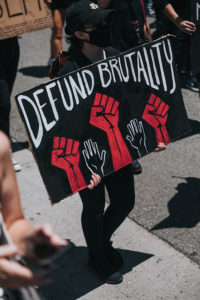Could “Defund the Police” Mean More Justice?
 Photo by Nathan Dumlao on Unsplash
Photo by Nathan Dumlao on Unsplash Over the last couple weeks at protests and rallies standing up against racial injustice, one phrase has stuck out as particularly controversial—“defund the police.” It’s easy to think that phrase is the beginning of a radical paradigm shift that could drastically impact our society. That was certainly my kneejerk reaction to hearing it for the first time.
However, “defund the police” means different things to different people. Many who chant it hope to address systemic imbalances in the United States, particularly in law enforcement, that have historically harmed communities of color. Rethinking the way policing is done, this thinking goes, could leave communities safer; it doesn’t mean communities will go unprotected.
Often across the country, whenever there’s a disturbance, altercation, or perceived danger, the police are called. Not only does this propagate police throughout communities, but it also tasks the cops with unrealistic expectations. “Defund the police” emphasizes reassessing our ethics and our values so we can better govern while keeping the peace, investing in communities, investing in people, funding schools, hospitals, public services, and infrastructure. It also makes us reconsider solving problems with means other than force—an idea that, unfortunately, has not been embraced by those in the White House.
Anyone who’s turned on the news or attended a rally in major metro areas since police killed George Floyd on May 25 has to have noticed police looking pretty intimidating and pretty militarized.
Under George W. Bush’s administration, military-style weapons and protective gear started flooding into US law enforcement after 9/11 for the purposes of fighting terrorism. In 2015 President Barack Obama issued an executive order to remove military-grade equipment from local police forces—a step in the right direction. However, Donald Trump rescinded Obama’s executive order in August of 2017, effectively making communities battlegrounds—all under the guise that such equipment was necessary to maintain community order.
Trump didn’t stop there—on June 1 (one week after Floyd’s death) he maintained that he is the president of “law and order,” an authoritarian strongman move to paint his power as absolute (it’s not—readers may remember we have checks and balances). As an extension of his authoritarian rhetoric, he urged governors in a call last week to come down hard on protestors to “take back the streets.” And Attorney General William P. Barr wants protestors and demonstrators charged with federal crimes. All these actions hint that the administration is enthusiastic to fight fire with fire and that its capability to walk the walk on true racial justice and rethink police tactics is a long shot.
It doesn’t help the case for justice that misinformation is rampant—and the phrase “defund the police” makes this movement incredibly easy to spin in an antagonistic manner. Many talking heads, especially individuals like Tucker Carlson, hear the phrase and throw the narrative down a misleading, antagonized, and defeatist path. These pundits would root for weakening or defunding agencies—the Environmental Protection Agency, the Department of Labor, the Consumer Financial Protection Bureau, the Food and Drug Administration, and the Department of Education, to name a few—but vigorously support increased resources to police. For authoritarians, it’s the only way to hold power. To them, only might is right.
Yet, history teaches that might isn’t the way to govern a pluralistic and diverse society in a just fashion.
We’ve seen the “defund” principle implemented in some form a few times already. About ten years ago, the city of Camden, New Jersey, across the river from Philadelphia, disbanded and reorganized their police department (effectively “defunded” before that was being discussed) to be less aggressive toward the community. Crime effectively fell by half in one of the cities with the highest crime rate in the country, and police officers’ place in the community has improved. (Although on Monday a group called Camden, We Choose Coalition held a press conference to argue that the changes were pushed through without community input and haven’t been good for lower-income areas.)
In 1972, to address racial discrimination happening in St. Louis, Missouri, a group of Black police officers founded the Ethical Society of Police (ESOP). In 2018, they expanded into the St. Louis County Police Department. The ESOP’s mission, in part, reads:
We are public servants. We champion fairness, equality and service. We hold ourselves and others accountable to our oath as Police Officers.
In addition to volunteering in the community and holding events, the ESOP helps to hold the St. Louis Police Department accountable by outlining race-based disparities, ineffective policing, race-based tactics, promotional bias, and other racially biased practices the department—willingly or unwillingly—engages in. In 2016, ESOP offered a report detailing these disparities to the department.
Both examples offer a common denominator—there is a significant need for police officers to change their attitude toward their communities and to hold each other accountable to any unjust or unethical action. The code of loyalty among police officers is now commonly seen as a barrier to protecting the public. “Who will police the police?” the old adage goes. In addition to the public holding the police accountable, the police must also police the police.
For the “defund” movement to succeed, it’s important for people, especially humanists, to look beyond how talking heads choose to spin it. We must look at substantive policy changes that shift resources to proliferating healthcare services, improving education systems in all communities, and eradicating homelessness.
If anything, the reactions from elected officials over the last few weeks should signal how they’ll react to increased democratic pressure to stamp out systemic injustice. The country needs fewer people saying they don’t believe there’s systemic racism or telling governors to get law enforcement to “dominate the streets” and more people willing to accommodate ethical solutions to improve communities.
